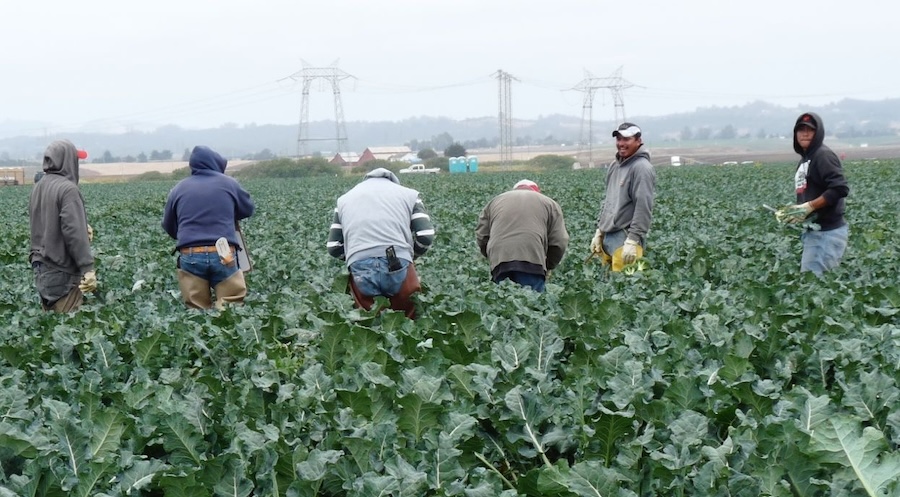
Current Curious Media Tropes on the Immigration Beat
Commentary - Thursday, September 4, 2025
By Jared Culver, Legal Analyst
As the media industry circles the drain, its coverage of most topics is becoming increasingly rote and routine, mirroring the political rhetoric of its particular partisan side. On immigration, this means the media reliably parrots the preferences of big business and open borders Democrats. A couple of recent trendy tropes involve the media’s obsession with the plight of agricultural employers hiring illegal labor and the “Maryland Man” insistence on refusing to acknowledge that aliens are illegally present in the country. So how is it they know precisely how many illegal immigrants are working on farms while simultaneously being blind to the immigration status of criminals?
First among the tropes is the media’s current obsession with the supposed labor shortage caused in the agriculture industry by mass deportations. The standard format for these stories is 1) a dire headline predicting some famine and food rotting in the fields because farmers cannot hire illegal labor on the black market, 2) the body of the story quoting lobbyists and Ag associations, along with a local farmer or two in the media outlet’s local area, and 3) interviewing an illegal alien worker with the most sympathetic story they could find.
Here are some examples:
-
NPR story headlined “Some Florida farmers reduce crops as deportation fears drive workers away”
-
USA Today sub-headline: “Farmers say few native–born residents will pick fruit or tend cows. The agriculture worker visa program can be costly, burdensome and limited. And they say Congress has failed to act for years.”
-
Even stories discussing abuse of the H-2A program have to insert quotes like this: “Edgar Franks, political director for the independent farmworker union Familias Unidas por la Justicia, based in Skagit County, said farm labor shortages caused by mass deportations could increase reliance on the program, and H-2A workers often face wage theft and poor housing.”
-
From Bloomberg: “Demand on H-2A Visa Program Grows as Migrant Enforcement Looms”
-
An exceedingly poorly written article from Ohio quotes Ohio Farmer Union President Bryn Bird as saying, “The lack of labor will surely hit all of us and our pocketbooks.”
-
The Arkansas Advocate got busy with the fear-mongering before Inauguration: “Trump migrant deportations could threaten states’ agricultural economies”
-
Even supposed friends of the workers at the Economic Policy Institute (EPI) have lamented the elimination of the black market in labor as costing jobs: “Trump’s deportation agenda will destroy millions of jobs”
-
The Alabama Reflector started spinning shortly after the 2024 election in November saying: “Agriculture, one of Alabama’s economic cornerstones, depends heavily on immigrant labor, particularly for tasks that domestic workers often avoid, such as planting, harvesting, and processing. In 2021, Alabama ranked among the top 20 states in agricultural production, a feat impossible without the labor of immigrants.”
-
CNBC sounds the alarm of ending dependence on illegal labor: “Trump’s immigration policy threatens key sectors of California’s economy, long reliant on immigrant workers”
-
CNN frames a confession by an Ag employer that half his workforce was illegal into a tragedy that he “lost” his workforce: “Deportation fallout: This farmer lost half his workforce. Now he’s losing his crop too”
And we could keep going until our eyes glaze over. Almost all of these stories follow the same routine of framing the enforcement of immigration law as the primary threat or problem creating shortages and rotting food, while framing employers as the victims rather than perpetrators. Cynics might believe this is a coordinated and paid-for effort by the powerful agricultural lobby in the United States.
One striking thing these stories have in common is no discussion of the exploitation and abuse on farms of illegal and legal workers alike. No questions asked about why wages remain low if shortages persist. It is almost as if the “reporters” are regurgitating the same talking points from lobbyists for the employers.
In contrast, another propaganda trope is the “Maryland Man” trope. This comes from Kilmar Albrego Garcia, who has been accused of smuggling and domestic abuse of his wife. For some reason, this citizen of El Salvador, illegally in the United States, is referred to as a “Maryland Man” by the press. Just as the media often omits “illegal” from the description of aliens, the framing is obviously designed to obscure any idea that an alien could or should be called an illegal immigrant.
-
Here is PBS about the illegal alien terrorist that set fire to people protesting for the return of Israeli hostages: “Federal and state prosecutors charged a man with 16 counts of attempted murder and with a hate crime after he allegedly set fire to demonstrators in Boulder, Colorado, who were marching in support of Israeli hostages. The Trump administration has condemned the attacker for his alleged crimes and also his legal status, saying he had overstayed his visa.”
-
Here is a local report headline of the Indian national driving a truck and making an illegal turn killing drivers: “Truck driver accused of making illegal U-turn that killed 3 is denied bond”
-
The illegal alien hired in Maine as a police officer is not referred to as such either: “ICE arrests Maine police officer, but his department claims DHS cleared him to serve”
-
Here is a headline regarding ICE arrests: “ICE has arrested almost 400 people in CT. Here’s the breakdown of who they are.”
-
Illegal immigrants arrested for theft referred to as simply twins: “Twin brothers arrested after burglarizing homes under construction”
-
A San Francisco article on ICE arrests uses every word in the thesaurus except “illegal”: “At least 13 migrants detained by ICE in San Francisco as arrests soar”
We could also continue forever listing examples of the media refusing to acknowledge the pertinent fact of illegal presence in the United States in their stories regarding arrests of illegal immigrants. This trend has been happening for years, if not decades, at this point.
These trends in media coverage are not just important because they highlight a troubling decline in quality media reporting. Instead, they also highlight the need for skepticism of other familiar media tropes regarding immigration. One of these is the notion that illegal aliens are less likely to commit crimes. This comes from the same people who deny illegal aliens exist in much of their reporting and instead refer to them by their residence inside the U.S., like “Maryland Man.” If the media is so willfully blind to the reality of the existence of illegal aliens, then how can we trust their reporting on that population’s propensity for committing crimes?
There is also the matter of cognitive dissonance regarding the clear admission of their existence when it comes to doing cheap labor jobs for the benefit of employers. When it comes time to spew the Ag lobby’s talking points, reporters freely admit that enforcement of immigration law will dramatically reduce the available labor force for farmers. But what happened to Maryland Man? How do the reporters know that farm labor is full of illegal immigrants at risk of deportation when they can’t determine the legal status of alien criminals apprehended by the police?
Of course, this is the outcome one expects from professionals paid to push propaganda. There is no loyalty to the truth, and no value accrues for consistency if your job is simply to push the narratives of the powerful. You cannot even expect a balanced view with differing perspectives from those who work for one side over the other. At some point, our formerly independent media was hijacked and replaced with corporate and political party stenographers. Consistency, truth, and objectivity are discarded for the sake of the narrative of the moment. It is a credit to Americans that most media is seeing massive declines in prestige, audience, and influence. If our media cannot wake up, there will soon be no one left to lie to.
In the meantime, IAP will continue to document the facts.

Commentary - New Analysis Says H-1B Workers Driving Down Wages

Video - Rosemary Jenks: ICE/CBP status during DHS shutdown, H-1B & AI

Video - Rosemary Jenks: DHS Shutdown, H-1B visas, SAVE America Act

Video - Rosemary Jenks outlines the path to mass deportations

Video - Rosemary Jenks discusses Immigration Enforcement Options
